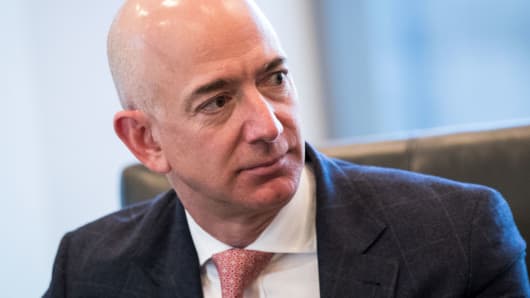Poor Jeff Bezos.
That may sound like a strange way to describe the Amazon founder and CEO Jeff Bezos on the day when he eclipsed Bill Gates and became the world's richest man. But that title comes with a greater chance of holy hell raining down on him, his company, and the entire U.S. tech sector.
Of course, Bezos has had something of a target on his back for some time. But now that he's the world's #1 rich guy, he's even more vulnerable. Here are the top three threats to Bezos' empire now:
War with Trump
One of the people targeting Bezos is none other than President Donald Trump, who has been openly complaining about Amazon and the Bezos-owned Washington Post since the height of the presidential campaign last year.
The taxes Amazon pays, or doesn't pay, is almost always at the center of those complaints.
It's not hard to see a pattern emerging where the president lashes out at Amazon and Bezos after he becomes enraged by a particular story in the Post. The fact that Bezos bought the paper as a private investor without folding it into the Amazon empire doesn't seem to matter to Trump as he now refers to it as the "Amazon Washington Post" in his tweets:
tweet
tweet
Of course, the administration is more than just President Trump. On Wednesday, Treasury Secretary Steven Mnuchin told a Senate panel that he's looking closely at Amazon's practice of collecting sales taxes on its own goods, but not on the sales of its third party vendors.
Taxes are one thing, antitrust concerns are another. Then-candidate Trump said Amazon has a "huge antitrust problem" back in May of 2016. Gates and his colleagues at Microsoft can tell Bezos a thing or two about how an antitrust probe or two can slow progress down and consume years and millions of dollars in resources. Spoiler alert: It can get pretty bad.
Populist revolt
Back in May, Bank of America Merrill Lynch chief investment strategist, Michael Hartnett released a report noting that the rising wealth in the American tech sector "could ultimately lead to populist calls for redistribution of the increasingly concentrated wealth of Silicon Valley." But anger at the wealthy or big corporations is often a little hard to cultivate and sustain. Perhaps the lack of a central human figure to attack was the reason why the "Occupy Wall Street" movement fizzled out.
Bezos may provide the populist movement with that kind of personal target, and he doesn't have some of the cultivated protections that his peers enjoy. Unlike Gates who has dedicated his post-CEO career to his charitable foundation, Bezos is quite publicly skeptical and cagey about philanthropy. Unlike Warren Buffett, Bezos doesn't have the near-slavish devotion of the news media and much of liberal America believing he's a billionaire on their side.
For now, Bezos may be fending off some of the worst of that predicted populist ire because of his ownership of the highly Trump-critical Washington Post. But it may not be enough.
With that in mind, Bezos might want to start taking notes on how Gates, Buffett, and even Mark Zuckerberg have avoided the kind of concentrated unpopularity that billionaires like John D. Rockefeller endured in their day. His much-criticized and seemingly clueless decision to ask for charitable ideas on Twitter earlier this year was not a good step in that direction. He's been a billionaire for years and should be further along in his philanthropic giving.
More competition
The title of richest man comes along with more than just added political and cultural scrutiny. It also means there will be an added focus on beating him in business. Bezos isn't just an investor like Buffett or semi-retired like Gates, he's still actively running Amazon and constantly expanding its reach.
That activity is clearly a valuable source of great wealth, which means it will attract more competition.
And here's where politics comes back into this: Bezos should expect his competitors to use his new status to their advantage as they seek political allies to help beat him in the marketplace.
That's what people like then-Sun Microsystems CEO Scott McNealy did at a Senate hearing back in 1998 when he told the Judiciary Committee that Gates and Microsoft had too much control over the "language of the digital age."
Bezos has said in the past that becoming a billionaire hasn't changed his daily life that much. That's a stretch for sure. But he's about to find out that becoming the richest man in the world, even when you've been a billionaire for years already, can change almost everything.
Commentary by Jake Novak, CNBC.com senior columnist. Follow him on Twitter @jakejakeny.
For more insight from CNBC contributors, follow @CNBCopinion on Twitter.



